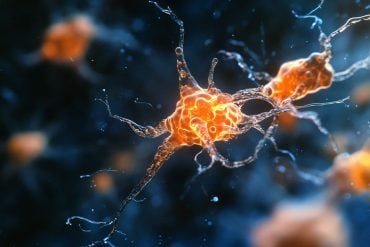Summary: At six months of age, babies born during the first year of the COVID-19 pandemic scored lower on developmental screening tests for social and motor skills than children born before the pandemic.
Source: Columbia University
Columbia researchers found that babies born during the pandemic’s first year scored lower on a developmental screening test of social and motor skills at 6 months—regardless of whether their mothers had COVID during pregnancy—compared to babies born just before the pandemic.
The study, which included 255 babies born at a NewYork-Presbyterian’s Morgan Stanley Children’s Hospital and Allen Hospital between March and December 2020, was published in the journal JAMA Pediatrics.
“Infants born to mothers who have viral infections during pregnancy have a higher risk of neurodevelopmental deficits, so we thought we would find some changes in the neurodevelopment of babies whose mothers had COVID during pregnancy,” says Dani Dumitriu, MD, Ph.D., assistant professor of pediatrics and psychiatry at Columbia University Vagelos College of Physicians and Surgeons and lead investigator of the study.
“We were surprised to find absolutely no signal suggesting that exposure to COVID while in utero was linked to neurodevelopmental deficits. Rather, being in the womb of a mother experiencing the pandemic was associated with slightly lower scores in areas such as motor and social skills, though not in others, such as communication or problem-solving skills. The results suggest that the huge amount of stress felt by pregnant mothers during these unprecedented times may have played a role.”
“These were not large differences, meaning we did not see a higher rate of actual developmental delays in our sample of a few hundred babies, just small shifts in average scores between the groups,” Dumitriu says. “But these small shifts warrant careful attention because at the population level, they can have a significant public health impact. We know this from other pandemics and natural disasters.”
Developmental trajectory of infants begins early
When the first wave of COVID hit New York City in early 2020, Dumitriu led a group of pediatric researchers at Columbia University Irving Medical Center and NewYork-Presbyterian in organizing studies investigating the impact of the virus on infants through the COVID-19 Mother Baby Outcomes (COMBO) Initiative.
In one early study, the researchers discovered that mothers do not pass the COVID virus to their fetus. However, it is known that viral illnesses during pregnancy increase the risk of neurodevelopmental delays in children through activation of the mother’s immune system, which in turn affects fetal brain development.
“The developmental trajectory of an infant begins before birth,” says Dumitriu, who is a pediatrician in the Well Baby Nursery at NewYork-Presbyterian Morgan Stanley Children’s Hospital. “With potentially millions of infants who may have been exposed to COVID in utero, and even more mothers just living through the stress of the pandemic, there is a critical need to understand the neurodevelopmental effects of the pandemic on future generations.”
In the current study, the researchers analyzed responses from a questionnaire that pediatricians give to parents to evaluate aspects of infant development, such as communication and fine and gross motor, problem-solving, and social skills.

Nearly half of the mothers in the study had COVID at some point during their pregnancies, though most of the illnesses were mild or asymptomatic.
No differences were found in scores between infants who were exposed to COVID in utero and those born during the pandemic whose mothers did not contract COVID during pregnancy. However, average scores among infants born during the pandemic—whether their mothers had COVID during pregnancy or not—were lower than the gross motor, fine motor, and social skills of 62 pre-pandemic infants born at the same hospitals.
“We want parents to know that the findings in our small study do not necessarily mean that this generation will be impaired later in life,” Dumitriu says. “This is still a very early developmental stage with lots of opportunities to intervene and get these babies onto the right developmental trajectory.”
Could COVID-related stress affect brain development?
Though the study did not measure maternal stress during pregnancy, Dumitriu says it’s possible that the stress caused by the pandemic and experienced by the mothers during pregnancy explains the drop in motor and social skills found in babies born during the pandemic.
Previous studies have shown that maternal stress in the earliest stages of pregnancy has a bigger effect on socioemotional functioning in infants than stress later in pregnancy, and a similar trend was found in the new study: Infants whose mothers were in the first trimester of pregnancy at the height of the pandemic had the lowest neurodevelopment scores.
Other factors, including fewer play dates and altered interactions with stressed caregivers, may help explain why babies born during the pandemic have weaker social and motor skills than babies born before the pandemic.
The researchers will continue to follow these infants in long-term studies.
About this neurodevelopment research news
Author: Press Office
Source: Columbia University
Contact: Press Office – Columbia University
Image: The image is in the public domain
Original Research: Open access.
“Association of birth during the COVID-19 pandemic with neurodevelopmental status at 6 months in infants with and without in utero exposure to maternal SARS-CoV-2 infection” by Dani Dumitriu et al. JAMA Pediatrics
Abstract
Association of birth during the COVID-19 pandemic with neurodevelopmental status at 6 months in infants with and without in utero exposure to maternal SARS-CoV-2 infection
Importance
Associations between in utero exposure to maternal SARS-CoV-2 infection and neurodevelopment are speculated, but currently unknown.
Objective
To examine the associations between maternal SARS-CoV-2 infection during pregnancy, being born during the COVID-19 pandemic regardless of maternal SARS-CoV-2 status, and neurodevelopment at age 6 months.
Design, Setting, and Participants
A cohort of infants exposed to maternal SARS-CoV-2 infection during pregnancy and unexposed controls was enrolled in the COVID-19 Mother Baby Outcomes Initiative at Columbia University Irving Medical Center in New York City. All women who delivered at Columbia University Irving Medical Center with a SARS-CoV-2 infection during pregnancy were approached. Women with unexposed infants were approached based on similar gestational age at birth, date of birth, sex, and mode of delivery. Neurodevelopment was assessed using the Ages & Stages Questionnaire, 3rd Edition (ASQ-3) at age 6 months. A historical cohort of infants born before the pandemic who had completed the 6-month ASQ-3 were included in secondary analyses.
Exposures
Maternal SARS-CoV-2 infection during pregnancy and birth during the COVID-19 pandemic.
Main Outcomes and Measures
Outcomes were scores on the 5 ASQ-3 subdomains, with the hypothesis that maternal SARS-CoV-2 infection during pregnancy would be associated with decrements in social and motor development at age 6 months.
Results
Of 1706 women approached, 596 enrolled; 385 women were invited to a 6-month assessment, of whom 272 (70.6%) completed the ASQ-3. Data were available for 255 infants enrolled in the COVID-19 Mother Baby Outcomes Initiative (114 in utero exposed, 141 unexposed to SARS-CoV-2; median maternal age at delivery, 32.0 [IQR, 19.0-45.0] years). Data were also available from a historical cohort of 62 infants born before the pandemic. In utero exposure to maternal SARS-CoV-2 infection was not associated with significant differences on any ASQ-3 subdomain, regardless of infection timing or severity. However, compared with the historical cohort, infants born during the pandemic had significantly lower scores on gross motor (mean difference, −5.63; 95% CI, −8.75 to −2.51; F1,267 = 12.63; P<.005), fine motor (mean difference, −6.61; 95% CI, −10.00 to −3.21; F1,267 = 14.71; P < .005), and personal-social (mean difference, −3.71; 95% CI, −6.61 to −0.82; F1,267 = 6.37; P<.05) subdomains in fully adjusted models.
Conclusions and Relevance
In this study, birth during the pandemic, but not in utero exposure to maternal SARS-CoV-2 infection, was associated with differences in neurodevelopment at age 6 months. These early findings support the need for long-term monitoring of children born during the COVID-19 pandemic.







